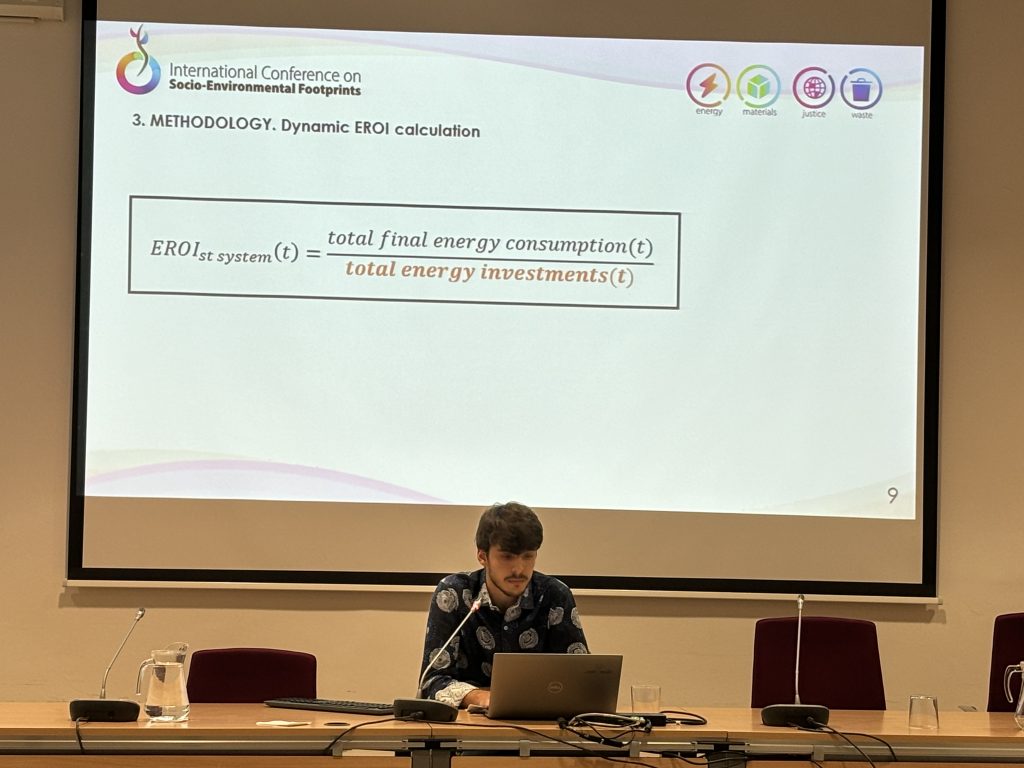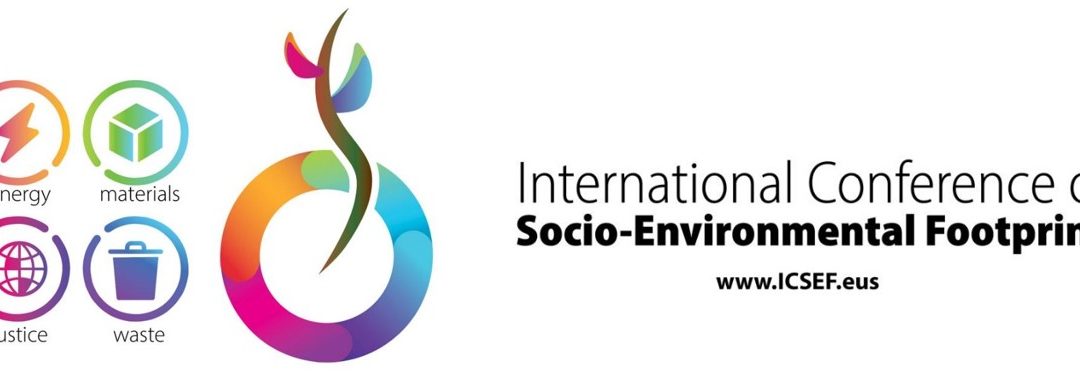From June 13 to 14, 2024, we attended the International Conference on Socio-Environmental Footprints (ICSEF), organized by the Life Cycle Thinking Research Group of the University of the Basque Country (UPV/EHU) and the non-governmental organization Medicus Mundi. The event took place at the Faculty of Letters in Vitoria.
The conference aimed to disseminate knowledge and generate analysis on energy justice, considering the global social and environmental footprints generated by the current economic model. This was done through four main themes: sustainable MATERIALS and certifications, WASTE Management towards zero waste, ENERGY System Footprints and International JUSTICE and National Footprints, each corresponding to a thematic panel on which various presentations and debates were held by the participants.
Day 1: Opening and panels on Materials and Waste
The first day began with the opening and presentation of the event by the non-governmental organization Medicus Mundi, which shared its working experiences on cooperation for development and environmental justice. Then followed Estitxu Villamor (professor at the UPV/EHU), who explained the definition of an environmental footprint, to conclude with Maider Iturrondebeitia (also a professor at the UPV/EHU), who introduced the Life Cycle Thinking Research Group and the Master’s Degree in Circular Economy of the UPV/EHU.
After the conference opening, the Keynote Speakers took the stage. Anne Owen, from the University of Leeds, discussed how living styles, gender and age affect carbon footprints, while Jukka Heinonen, from the University of Iceland, explored the potential of Life Cycle Assessment (LCA) in quantifying socio-environmental impacts and suggested future research lines (highlighting the need to dynamize LCA analyses). He also strongly advocated for the authors of life-cycle analysis process to estimate the truncation of their research. Then, he asked for more explanation for the difference between the results of a life cycle paper and the existing literature (boundaries of the process, data used…). Following this, the Materials panel presentations began, where the footprints of various products, companies, and services were discussed. Topics included: application of LCA to the graphene production process, the potential use of fungi as a source of chitin, energy footprints in Iceland, toxic emissions associated with buildings (advocating to better include other indicators than carbon footprint in LCA), and LCA analysis of freight and passenger transport in Europe, among others.
The afternoon continued with the Waste panel, focusing on waste measurement and management, as well as the circular economy. Topics included: economic sustainability of chitin obtained from fungal resources, identification of critical emission points of greenhouse gases in municipal waste management, environmental and economic implications of product repair, plastic waste management and efficient recycling, and environmental performance of plastic recycling systems, among others.
Day 2: panels on Energy and Justice and Closing
The second day continued with the Energy and Justice panels, preceded by the Keynote Speakers. Jens Peters, professor at the University of Alcalá, presented the latest LCA research related to sustainable energy storage systems. He also emphasized on the need to do developed dynamic life cycle analysis to take into account future scenarios, for example, concerning the recycling rate which should be higher in the future than today improving the current LCA of batteries. Julia Martí Comas and Ana María Palacios, from Colectivo Amarantas, explained how to identify, measure, and revert the social impacts of corporates in the Global South from a feminist perspective.
During the Energy panel, the footprints of the current energy system and specific components/products were explored. Topics covered included: the material footprint of photovoltaic panels on buildings in Vitoria, carbon footprints in each Autonomous Community in Spain, advances in energy storage using biopolymers, and the environmental impacts of oil extraction in the Yasuní Reserve of the Amazon Forest, among others. In addition, our researcher-in-training, Juan M. Campos, made a presentation about the potential and limitations of hydrogen for the energy transition, where he shared preliminary results regarding the impact of hydrogen on carbon dioxide emissions and on the Energy Return on Investment (EROI) of the energy system. The presentation of these results was very well received at the conference, as throughout the sessions the need to analyse indicators beyond carbon dioxide emissions (in the context of the energy transition) was highlighted; for our side, and as we have been doing for some time, we analysed the results for the EROI of the system.

Finally, the Justice panel focused on international responsibilities and differences in environmental footprints between the Global North and the Global South. Topics included: the journey of textile waste from the Global North to illegal landfills in the Atacama Desert (Chile), development of databases to measure agri-food consumption footprints, the need to introduce LCA knowledge in Universities (for future jobs), perspectives on low-carbon societies in different European environments, climate justice and its policy implications, and the impact of carbon emissions between developed and developing countries, among other topics.
In conclusion, the ICSEF conference provided an excellent stage for exchanging knowledge and discussing critical issues related to the socio-environmental footprint. The panels offered a wide range of research and perspectives, highlighting the importance of international collaboration and an interdisciplinary approach to addressing global environmental challenges.
Juan Manuel Campos and Tristan Martin



